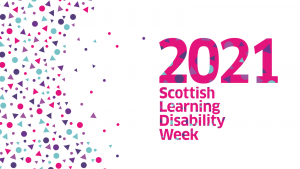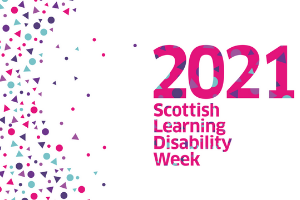People with Learning Disabilities’ Experiences of SDS

Scottish Learning Disability Week (10 – 16 May 2021), is a chance to focus attention on the lives of people with learning/ intellectual disabilities in Scotland. It is a chance to raise awareness of issues and inequalities, achievements and talents. The week matters because there are over 125,000 people in Scotland who have learning/intellectual disabilities, and raising awareness provides a real chance to change attitudes, making Scotland a better, fairer and more equal place for everyone.
Learn more about Scottish Learning Disability Week here.
We’re supporting the week by focusing on the My Support, My Choice (MSMC) research which recognised people with learning disabilities’ experiences of Self-directed Support (SDS) and made recommendations on how to improve them.
As part of our ‘My Support, My Choice’ research project delivered in partnership with the Health and Social Care Alliance Scotland (the ALLIANCE), we heard about the experiences of 124 people with learning disabilities via a survey, interviews and focus groups.
An easy read of the thematic report is available here.
Please read on for some key findings from the research.
Information About SDS
Many of the people with learning disabilities report positive experiences of finding out information about SDS, with people getting information about Self-directed Support from different types of places. Lots of people said it was easy to get information.
Some people said it was difficult to get in touch with social work when you were trying to get Self-directed Support. People with learning disabilities said their questions were not answered more often than other people.
Some people were not given information that was accessible for them and some people had asked for accessible information and have still not got it.
Informed Choice and Control
Most people with learning disabilities felt fully involved in decisions about their care and support. However, people with learning disabilities were less likely than other people to have been able to make their own choices about their support.
Communication and Relationships with Social Work
People said that it is important to have good relationships with social workers where there is trust.
Many interviewees reported positive and favourable experiences of assessments and reviews with professionals, while others shared concerns around not receiving full answers to questions asked during assessments. Several people shared troubling stories of being treated with disrespect by social work or social care professionals.
Impact of SDS on Family/ Relationships
Some people said they have better relationships since getting a budget. The report says social workers should respect people’s wishes if they do not want their family to be their main carer.
Care Staff Recruitment, Training, and Quality
People said good support workers made a positive difference to their lives, but some people find it difficult to recruit support workers. Some people had difficulty with finding good training for support workers.
Some people with learning disabilities said they would like some help to arrange staff training.
Independent Advocacy and Support
People with learning disabilities said that having an advocacy worker is really helpful. An advocacy worker is someone who can help you to speak up for yourself.
These services need to be given enough money to make sure that advocacy and advice is available to everyone who wants it.
Recommendations
The My Support My Choice: People with Learning Disabilities’ Experiences of Self-directed Support and Social Care Thematic Report includes 52 recommendations for improvement to respond to people’s concerns, build on existing good practice, and increase the effectiveness and reach of positive SDS experiences. Recommendations include:
- People need to be able to get good clear information about Self-directed Support and social care.
- Information needs to be available in a range of different types for example Easy Read.
- Social worker professionals should be given training in supported decision making.
- People should be told they have the right to change social worker if they do not feel they have a good trusting relationship.
- Social workers need to have the time and skills to build relationships and trust with the people accessing SDS and unpaid carers that they are working with.
- Social workers should not expect families to give care for free.
- Some people with learning disabilities need more help from local authorities to recruit and train care staff.
- Local authorities should work with people who access SDS and unpaid carers to improve systems and processes related to care staff recruitment, training and quality.
- People who work for the local councils should be given training and information about advice, support and advocacy. This will help to make sure they tell people with learning disabilities that it is available.
Next steps
SDSS and the ALLIANCE are engaging with the Scottish Government and membership organisations to act on the learnings from My Support, My Choice.
You can read the My Support My Choice: People with Learning Disabilities’ Experiences of Self-directed Support and Social Care Thematic Report in full here.
An easy read of the thematic report is also available here.

